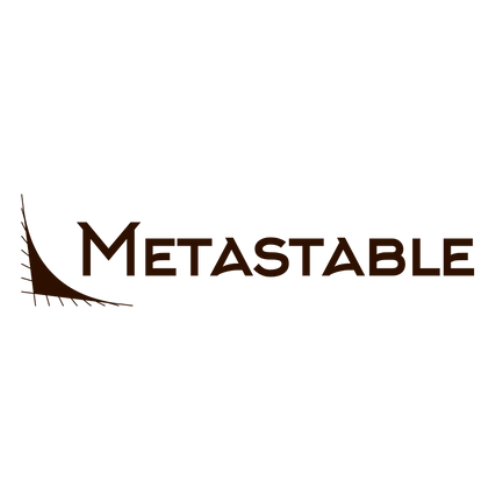
Metastable
MetaStable is a decentralized finance (DeFi) platform that aims to provide a secure, private, and compliant environment for trading synthetic assets. The company is focused on leveraging advanced cryptographic techniques to solve some of the key challenges in the DeFi space, such as high slippage, impermanent loss, and regulatory uncertainty.
The core of MetaStable's service is its Automated Market Maker (AMM), which is designed to facilitate the trading of synthetic assets with minimal price impact. A key feature of the platform is its use of Zero-Knowledge Proofs (ZKPs), which allows for the verification of transactions without revealing the underlying data. This provides a high degree of privacy and confidentiality for users. The platform also includes a "DeFi Firewall," a proprietary technology that helps to ensure regulatory compliance by preventing illicit funds from entering the ecosystem.
MetaStable’s "chain-agnostic" design and support for EVM-compatible DLTs allows it be interoperable with various networks including the Hedera blockchain.
Project Information
Related Projects

Mingo is a digital communication platform built on the Hedera network. It was designed to merge traditional messaging with the power and efficiency of Web3. Its foundational feature is a multi-messaging aggregator that consolidates various chat services into a single, unified inbox. This allows users to manage conversations from different platforms without constantly switching applications.
It features a multi-asset crypto wallet powered by Hedera, enabling users to securely manage HBAR and other Hedera-based tokens adding transaction features to its chat services. By utilizing the Hedera public ledger, Mingo facilitates instant, low-cost crypto transactions directly within a simple chat interface.
In addition to its Hedera-powered wallet and message aggregator, Mingo provides its own secure, end-to-end encrypted Mingo Chat. The platform’s strategic goal is to leverage Hedera’s speed, security, and low fees to bridge the gap between Web2 and Web3. It seeks to demystify cryptocurrency and encourage mainstream adoption by embedding intuitive and powerful decentralized finance functionalities into an essential, everyday communication tool.

ServiceNow is an American software company, founded in 2003, that provides a cloud-based platform for automating and managing business workflows. Headquartered in Santa Clara, California, ServiceNow’s core offering is the the Now Platform, an intelligent and intuitive cloud platform that automates workflows across IT, employee, and customer service departments.
The Now Platform allows businesses to streamline operations, optimize productivity, and create seamless experiences for both employees and customers. It includes a suite of applications for IT service management (ITSM), IT operations management (ITOM), strategic portfolio management, and more.
As a member of the Hedera Governing Council, ServiceNow is leveraging the Hedera Consensus Service to create immutable and auditable records of transactions and interactions that occur on the Now Platform. This integration enables the creation of trusted, multi-party business processes, enhancing data integrity and enabling new possibilities for tokenization, decentralised identity, and secure data sharing across organizational boundaries. This allows ServiceNow to extend the reach of its digital workflows to entire business ecosystems.

Flowcarbon is a climate technology company focused on the Voluntary Carbon Market (VCM). Its mission is to make carbon markets more transparent, liquid, and accessible, through the use of blockchain technologies, thereby accelerating the flow of capital directly to projects that reduce or remove carbon emissions from the atmosphere. The company addresses critical inefficiencies in the traditional carbon market, such as opaque pricing, high transaction costs, and limited access for smaller participants.
The core of Flowcarbon's model is the tokenization of high-quality, verified carbon credits. Each token represents a real-world, certified tonne of carbon offset. This process creates a transparent and immutable record of ownership and transactions, enabling credits to be traded efficiently on digital marketplaces. One of the company’s initial token concepts was the Goddess Nature Token (GNT), designed as a liquid asset backed by a bundle of nature-based carbon credits.
By creating a more functional and efficient market infrastructure, Flowcarbon aims to provide project developers with faster access to financing and better price discovery. For buyers, from large corporations to individuals, it offers a more direct and transparent way to purchase credits and offset their carbon footprint.

Hyperstack is a Web3 company developing the "Credential Cloud" platform for issuing, managing, and verifying smart, secure, and immutable digital credentials. Its mission is to revolutionize digital identity by providing a no-code, high-impact framework that can be used by a wide range of organizations, from educational institutions to corporations.
The core of Hyperstack's service is its comprehensive credential management platform. This includes a design studio for creating custom-branded digital certificates and badges, tools for issuing credentials at scale, and a secure digital wallet for recipients to store and share their credentials. A key feature of the platform is its robust analytics dashboard, which allows issuers to track engagement with their credentials, providing valuable insights into their reach and impact. The platform is also designed for seamless integration with existing systems, such as Learning Management Systems (LMS) and HR platforms.
Hyperstack's entire platform is built on the Hedera network. It uses the Hedera Token Service (HTS) to mint credentials as NFTs, providing a secure and efficient way to manage their ownership and transfer.
